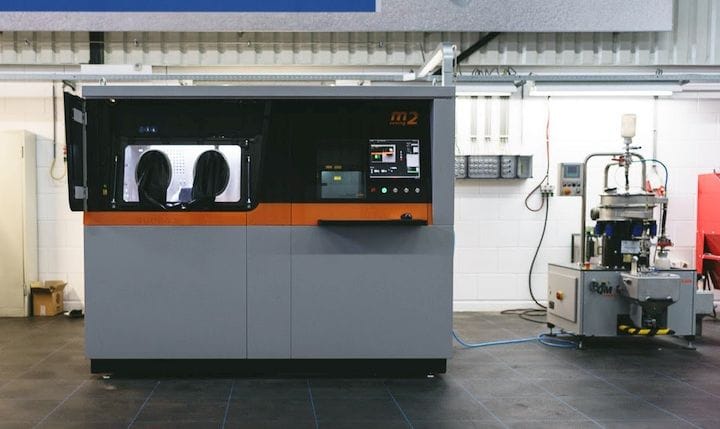![Manufacturing equipment [Source: 3D Hubs]](https://fabbaloo.com/wp-content/uploads/2020/05/image-asset_img_5eb09a6d778a1.jpg)
3D Hubs has secured a huge US$18M investment round.
The Amsterdam-based company has made an incredible pivot from their original concept of a worldwide network of consumer-level desktop 3D printers, as it seems that most people who require that type of print quality ended up purchasing their own desktop equipment, which is now available at low prices everywhere.
They, like others in the industry, had to react to the demise of interest in consumer 3D printing, and they seem to have done so quite successfully.
3D Hubs adapted their requestor-provider cloud to shift from serving consumers to instead serve larger businesses, professionals and industry. They did so by recruiting operators of larger industrial 3D printing gear to join their network, and adapted their online interfaces to suit a new type of client.
They also added manufacturing features beyond 3D printing, such as injection molding and CNC milling. These additions make considerable sense, as their new client base is less interested in the technology (of 3D printing) and more focused on simply getting a good result regardless of the technology. The new manufacturing features allow 3D Hubs clients to pick the right technology for the job without leaving the 3D Hubs environment.
But now they’ve received a huge US$18M investment, bringing their lifetime total investment to around US$30M. The latest round includes a bevy of powerful investors, including: Hearst Ventures, EQT Ventures, Balderton Capital, Arthur Kosten (founder of Booking.com) and, surprisingly, Erik de Bruijn (founder of Ultimaker).
What do they intend on doing with this cash hoard? They explain:
“Funds will be used to advance the company’s automation of key features for the manufacturing process, including quoting, design validation and smart order routing to its global network of suppliers.”
![Improvements may be coming to 3D Hubs’ interfaces and process [Source: 3D Hubs]](https://fabbaloo.com/wp-content/uploads/2020/05/image-asset_img_5eb09a6dd91f4.jpg)
In other words, complete and refine their transition to the new business model. While their current system is entirely usable by industry, it’s likely they wish to provide additional functions that ease the workflow — and add some 3D Hubs stickiness — to their system. There will be no intent on improving their original consumer-style functions.
I believe this is a very good time for such investment, as the space is now becoming crowded with similar competitors, all offering networks of various types of manufacturing services, including 3D printing, but increasingly beyond. 3D Hubs will have a hard time competing, as will all those in this market.
However, the US$18M will make that a lot easier.
Via 3D Hubs











A blog post reveals much of what happens behind the scenes at 3D print service Shapeways.